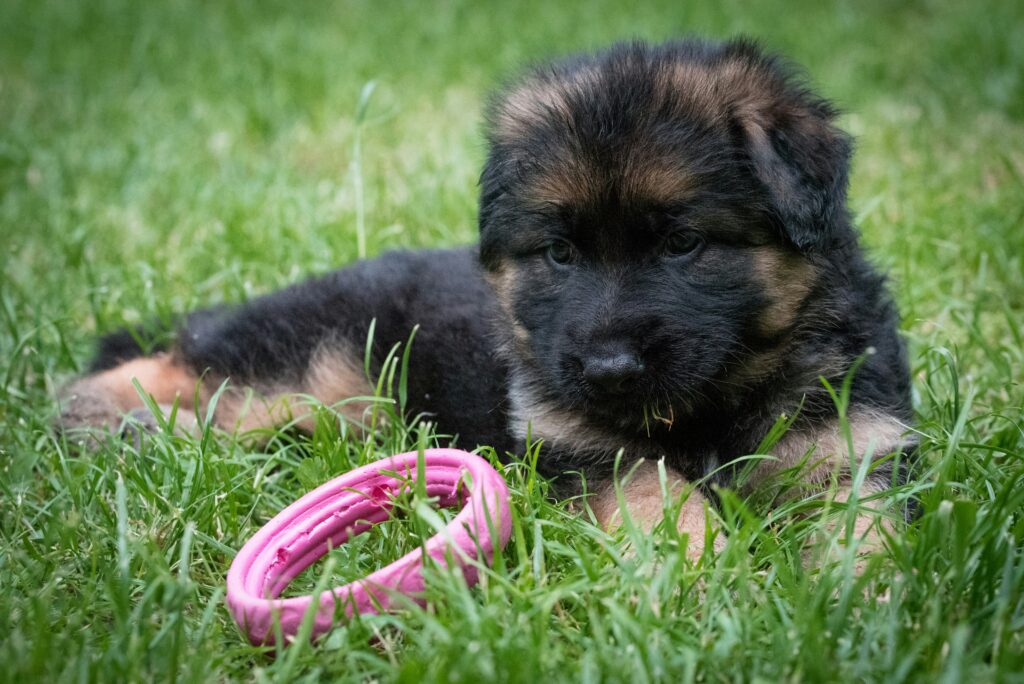The German Shepherd is one of the most intelligent and loyal dog breeds in the world — but even the smartest puppy still needs proper training, especially when it comes to housebreaking.
With the right methods and a consistent routine, potty training a German Shepherd puppy can be smooth, stress-free, and quick. In this guide, you’ll find 7 vet-approved tips to help your pup develop clean bathroom habits and become a well-behaved companion.

Image: Unsplash
1. Start Potty Training Early
The earlier you begin, the better. Most breeders allow puppies to go to their new homes at 8 weeks of age, which is the perfect time to start housebreaking.
At this stage, your puppy can begin to understand basic routines and develop good habits — though accidents will still happen.
✅ Pro Tip: Puppies under 4 months old should be taken out every 1–2 hours during the day.
2. Set Up a Designated Potty Spot
Choose a specific outdoor location (or a pee pad spot if indoors) where your puppy will consistently go to relieve themselves.
Dogs are creatures of habit, and a single designated area helps them associate that space with going potty.
Each time you take your puppy out, use a consistent verbal cue like “Go potty” or “Do your business”.
3. Establish a Consistent Routine
German Shepherd puppies thrive with routine. Create a structured daily schedule that includes:
- First thing in the morning
- After every meal
- After naps
- After play or training sessions
- Before bedtime
- Every 2–3 hours during the day (if under 6 months old)
📅 Consistency reinforces bladder control and trains their internal clock.
4. Use Crate Training to Encourage Clean Habits
Crates are a powerful tool for potty training when used properly. Because dogs instinctively avoid soiling their sleeping area, crates help teach bladder control.
Choose a crate just big enough for your puppy to stand, turn around, and lie down comfortably — no larger, or they might potty in a corner.
✅ Always take your puppy out immediately after crate time to prevent accidents.

Image: Unsplash
5. Watch for Potty Signals
Learn to recognize the common signs your German Shepherd puppy needs to go out:
- Circling or pacing
- Sniffing the floor
- Whining or scratching at the door
- Suddenly stopping play
When you see these signals, act quickly and guide them to the designated potty area.
6. Reward Immediately After Success
German Shepherds are eager to please and respond exceptionally well to positive reinforcement.
Each time your puppy potties in the correct spot:
- Praise them immediately with a happy voice.
- Give a treat or play with a toy as a reward.
❌ Never punish accidents — it causes fear, delays progress, and may damage trust.
7. Be Patient and Consistent With Accidents
Accidents are inevitable, especially in the first few weeks. What matters most is how you handle them:
- Do not scold or rub their nose in it.
- Clean the mess immediately with an enzyme cleaner to eliminate lingering scent.
- Review the routine — are you taking them out often enough?
If accidents persist beyond 6 months of age, consult a vet to rule out urinary issues or stress-related behavior.
🐾 Bonus Tip: Bell Training (Optional but Effective)
Some owners find success teaching their German Shepherds to ring a bell hung by the door to signal potty time.
This method is great for communication and can reduce door-scratching or barking.
Frequently Asked Questions (FAQ)
1. How long does it take to potty train a German Shepherd puppy?
With consistency, most German Shepherd puppies are reliably house-trained in 4–6 months.
2. Should I punish my puppy for accidents indoors?
No. Focus on rewarding correct behavior instead of punishment.
3. Is crate training necessary?
It’s highly recommended. Crate training helps with potty control and keeps your puppy safe when unsupervised.
4. Can German Shepherds be potty trained faster than other breeds?
Thanks to their intelligence, German Shepherds often learn faster than average — if trained consistently.
5. When should I stop crate training?
You can gradually reduce crate time around 6–8 months old, once your dog has developed reliable bathroom habits.
Potty training a German Shepherd puppy is a journey that requires patience, structure, and positivity. With a consistent schedule, crate training, and rewards for good behavior, you’ll set your pup up for lifelong success.
Remember, every dog learns at their own pace — but by following these 7 vet-approved tips, you’re giving your GSD the best start possible.

Leave a Reply